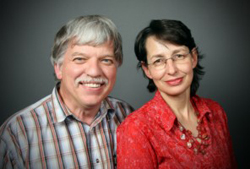In Africa, HIV/AIDS isn't just killing individuals. It's killing entire countries. In Swaziland, the infection rate is more than 30 percent. In the last 25 years, the southern African country's population has declined from more than 2 million to less than 1 million.
"There's not a single person in Swaziland who has not been affected," the Rev. Arnau van Wyngaard told workshop participants during the Uniting General Council of the World Communion of Reformed Churches here June 18-28.
A pastor in the Dutch Reformed Church of South Africa who has served as a missionary in southern Swaziland since 1985, van Wyngaard said he started reading about the virus after the first case of HIV/AIDS was diagnosed in 1986. "I didn’t think much about it at first," he said, "until a doctor friend of mine warned that AIDS was going to be catastrophic."

Caregivers handing out blankets and food to the poorest of the poor in the drought-stricken Nsalitje area. —Shiselweni Reformed Church Home-Based Care
By 1991 van Wyngaard was heavily involved in efforts to educate church members about the threat posed by HIV and has devoted full-time since 2005 to HIV/AIDS ministry. That ministry — Shiselweni Reformed Church Home-Based Care in Swaziland (SRCHBC) — a ministry of the Swaziland Reformed Church — has rapidly become not just a model of care-giving but of how to mobilize large-scale volunteer efforts to combat community problems.
SRCHBC trains cadres of care-givers to visit HIV/AIDS sufferers in their homes — providing encouragement, monitoring their condition and ensuring that those who can take anti-retroviral drugs maintain their regimen and cleaning and dressing their wounds.
Going from village to village, Shiselweni has grown from a single team of 36 care-givers trained by van Wyngaard's in January 2006 to a total of 25 teams and more than 800 volunteers today.
Overcoming stigmatization and medical misconceptions — that the virus can be transmitted by hugs, for instance — has been a valuable side-effect of SRCHBC's ministry, van Wyngaard said.
"I began by preaching from Luke 5 about Jesus reaching out and touching the leper, violating all the purity laws of the time," he said. "God is telling us that if we want to make a difference, wh have to literally reach out and touch those in need. I then started to deliberately touch our clients — it released my own fear and set an example."
(Luke 5:12-14 – Jesus reached out and touched the leper, violating all the purity laws — God telling us that if we want to make a difference we have to literally reach out and touch those in need); I began to deliberately touch people – released my own fear and set an example."
Each of SHCRBC's teams organizes its own leadership. Typically each care-giver has three or four clients. The training is rigorous, typically lasting a week. "We want to have the highest standards," van Wyngaard said. "It establishes trust in the communities and attracts the highest-quality volunteers."
Van Wyngaard brooks no excuses. "The standard answer in Africa to problems of this magnitude is 'We don't have the money. In the U.S. it's 'We don't have the people,'" he said. "But the church always grows when it becomes part of the community as a servant. That's what's happened with this ministry.
"And don't concentrate on the finances, concentrate on the work," van Wyngaard said. "If you are doing the right thing, God will provide the funds."

